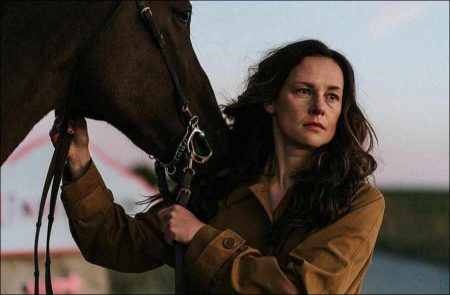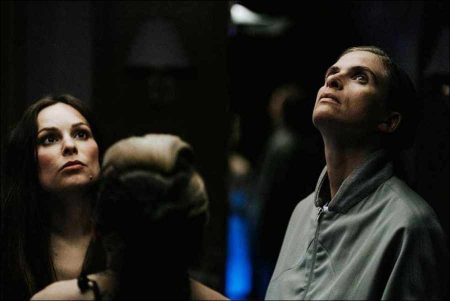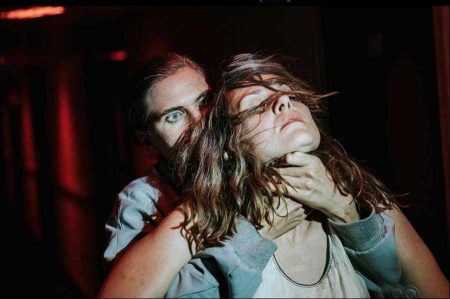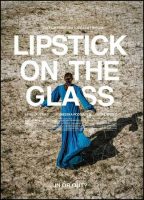Taglines: The escape to oneself.
Lipstick on the Glass movie storyline. When a mysterious figure enters Emeryka’s life, her seemingly perfect family life is turned completely upside down. Dissatisfied with her marriage and her place in this world, she is tempted by a mysterious encounter to embark on an adventurous escape that leads her directly to a women’s sect in the hope of finding security. Director Kuba Czekaj stages an emancipatory journey of longing for equality, sexual freedom and the union of mother and daughter. Accompanied by unique visual images and a psychedelic soundtrack, the film is a wild ride that breaks all genre conventions.
In ‘Lipstick on the Glass’, the fascinating story of Emeryka unfolds, whose life takes an unexpected turn when she meets a mysterious person. A magnetic attraction develops between the two, drawing Emeryka into a maelstrom of passion and danger. When the ruthlessness and violence of her criminal husband Bogey gets out of hand, they flee from him, Emeryka reluctantly leaving her daughter behind. But their escape leads them in a roundabout way into the clutches of a mysterious sect. In the hands of a group that promises Emeryka freedom and love, she must make a momentous decision that will not only seal her own fate, but also that of her family.

Film Review for Lipstick on the Glass
Agnieszka Podsiadlik and Stipe Erceg in Lipstick on the Glass
The long-awaited third feature by Polish director Kuba Czekaj is finally here and is adorned with a particularly appealing title. Lipstick on the Glass already paints a vivid picture, a close-up if you’d prefer, the mark of a sexualised presence that has now turned into absence.
Indeed, one might think of Dario Argento’s Dark Glasses, where the titular object was also a symbol of a woman’s transformation, and no wonder: Czekaj is indebted to all things giallo for his complex web of vivid imaginaries and is not afraid to own it. After premiering his previous works at the Berlinale and Venice, this time, the director launches his ambitious new project on domestic turf, as a suitable participant in New Horizons’ Midnight Madness strand.
At the film’s heart lie yearning (even if that very same word is presented as something abominable later on) and the desire to change: a metaphorical process of shapeshifting awaits the unruly protagonist Emeryka (Agnieszka Podsiadlik). She is a wife to her macho husband Bogey (Stipe Erceg) and a mother to her young daughter (Lili Lublinski), both of whom have unrealistic expectations of her respective roles and serve as nothing short of caricatures for the patriarchal regime.
Bogey is a glaring example: from his sleazy smile to his violent tendencies and a tattoo across his chest that reads “Testosteron”, he is every woman’s nightmare. A more compelling backstory, it seems, has been vested in the couple’s daughter, whose oppressive complaints target Emeryka’s own intuitive idea of motherhood. “I had a dream that I was weighing you down,” the girl says, articulating the ambivalences of womanhood incipient at an early age.
Luckily, help is on the way. A wave of anti-patriarchal, anti-normative activism which has solidified into something not too dissimilar to a women-only cult, has tried to encroach on Emeryka’s newfound freedom. Leaving a life of obedience behind is no easy feat, and the film uses every single tool at its disposal to create a blend of terror and pastiche: slow-motion, artificial lighting, a psychedelic soundtrack and eerie superimpositions track the character’s journey out of family life. Aided by an androgynous individual called The Something (a stunningly harsh Lena Lauzemis), Emeryka is about to discover the joys and pains of queer life and sexuality as a massive form of protest against the shackles of her daily life thus far.
Lipstick on the Glass strives really hard to be a queer film: it’s imaginative, anti-dogmatic, and it reinvents itself along the way. For the most part, it succeeds, as with a visual arsenal of affecting images, in turn both beautiful and grotesque, it ranks up there with its giallo predecessors.
In one particular scene, the use of superimpositions and slow transitions between shots as we see a woman, a knife and a disfigured face – all drenched in deep, crimson red – verges on perfection in a genre-bending approach to storytelling. However, the film’s exquisitely messy look can’t make up for the plot deficiencies. A thin plot is not a bad thing per se, but Czekaj seems to insist on having a plot, twists, turns and more conventional narrative tropes along the way, instead of just letting the mood do the talking. Podsiadlik and Lauzemis share sizzling chemistry, and their presence alone could have propelled the film forward into nightmarish territory, in style.
The promise of a feminist utopia is a well-fabricated lie, and the film owns up to this fact in what feels like a very bold ending that refuses to tie up loose ends. Such bravery would have worked wonders over the rest of its running time. Even if their rationale is endlessly complex, pleasure and pain are simple, experientially.
Lipstick on the Glass (2024)
Directed by: Kuba Czekaj
Starring: Agnieszka Podsiadlik, Lena Lauzemis, Stipe Erceg, Bobbi Salvör Menuez, Laura Benson, Lili Lublinski, Mari Malek, Mina Tander, Nat Cmiel, Jagoda Siwek, Mercedes Müller, Cezary Kolacz
Screenplay by: Kuba Czekaj
Production Design by: Mela Melak
Cinematography by: Tomasz Wozniczka
Film Editing by: Daniel Gasiorowski
Costume Design by: Svenja Gassen
Art Direction by: Grzegorz Dzierbicki
MPAA Rating: None.
Distributed by: W-Film
Release Date: July 25, 2024
Views: 38






